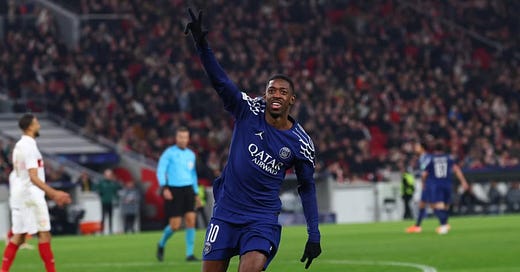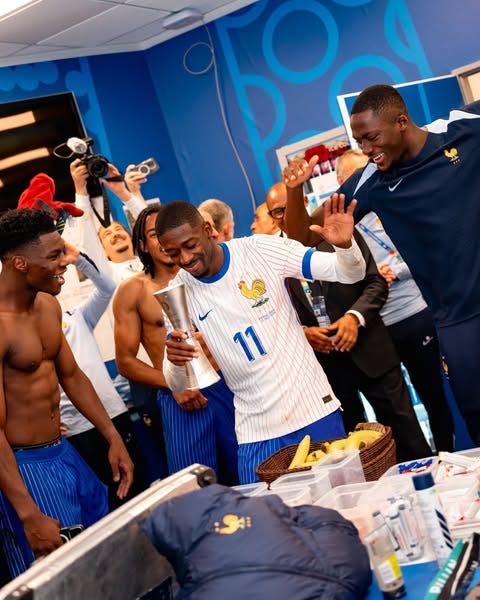Dembele (Finally) Delivers
In the post-Kylian Mbappe era at PSG, Ousmane Dembele might finally be delivering on his potential.
This is a guest article by Chirag Sharatkumar. Subscribe to Sideline Stories.
Welcome to modern football, ladies and gentlemen. The pressure here, as expected, is rather immense.
It lingers, thick in the air, an unrelenting force nagging at those who bear the burden of expectation. Some players seem immune to it, as if they were made for these moments, their bodies and minds forged in the burning white heat of elite sport. Ousmane Dembele has not historically been one of these players.
One need not look far nor wide to gain an understanding of Dembele’s career. It has been presented, thoroughly and unfairly, a narrative wrapped consistently around him like an ill-fitting coat from the moment he arrived at Barcelona with a mouth-watering price tag attached to his back.
The narrative has historically been a simple one. A story of undeniable talent, but also of doubt and frustration. Dembele has often been a player painted in the broadest, bluntest monochromatic strokes, a lazy footballer. He was the poster boy for undisciplined youth and unserious attitude, somewhere between a poor man’s Jamie Vardy and a less angry Mario Balotelli.
The picture of Dembele, painted through the media’s eyes, has been equally clear. Here we have an unfocused, undisciplined kid, one who rejects the high-protein, low-carb diet football prescribes him for soft drinks and junk food. He spends his nights playing video games on his PlayStation instead of doing whatever it is the traditional athlete must be doing.
Here we have a player who would forever promise more than he delivered, one who could ignite but never sustain. On the pitch, he was sensational but only for a fraction of a second. A born dribbler, rapid in his movement, only to lure you into a sense of possibility and potential, before popping the balloon with an infuriatingly poor finish (see: minute 96, Barcelona vs Liverpool, Champions League semi-final first leg, 2019).
He was Barcelona’s most-fined player, the pinnacle of the “all bite but no bark” footballer. His time in Catalonia played out as a series of false dawns, flashes of brilliance suffocated by injuries, inconsistencies, and the creeping suspicion that this was a player who simply wasn’t built for the demands placed upon him.
It was a familiar tale, and at some point, it became simply accepted as fact. There would be no great renaissance, no late twist in the plot. He was what he was: erratic, unreliable, occasionally electrifying but ultimately incomplete.
There have been plenty of criticisms of Dembele, and some of them deserved considering that until very recently, he had spent the better part of his decade-long career underperforming. Since making his top-flight debut for Rennes in 2015, he has only ever had two seasons with 20 or more goal contributions: his first at Borussia Dortmund in 2016/17, where he was electric, picking up 10 goals and 20 assists; and his second at Barcelona in 2018/19, his “best of the worst” catalogue, where he picked up 14 goals and seven assists.
Until now.
Now, something has changed. What started as a neat little hot streak became the purplest of patches, and then a run of form that commands recognition. Dembele has found the back of the net in all but one league game since the new year, making him not only one of the most in-form players in Europe, but crucially, one of the most clinical.
If previously we saw one Dembele narrative, here the numbers present another. Twenty-four goals in 31 games this season, and five neat assists to go with them. Back-to-back hat-tricks four weeks ago against VfB Stuttgart in the Champions League and Brest in Ligue 1, making him the first-ever PSG player to achieve the feat. A player once ridiculed for his wastefulness, whose finishing once left something — nearly everything — to be desired is now scoring goals with a conviction few thought possible.
Dembele ranks in the 99th percentile of forwards in Europe’s top five leagues for shot-creating actions, non-penalty expected goals and expected assists, expected assisted goals, progressive passes, progressive carries, passes attempted, successful take-ons, touches and progressive passes received.
Yes, he is bang in form.
Of course, there is something to be said for the team he is playing for and the role he is playing in. Dembele has been moved central this season, reinvented not as the frantic, erratic winger of old but as something different: a false nine who thrives in tight spaces, a player encouraged to use his pace, his ambidexterity, his unpredictability not just as a weapon but as a foundation.
Playing in front of a workhorse midfield comprised of Vitinha and Joao Neves helps, obviously, as does having dynamic wingers in Bradley Barcola and Kvicha Kvaratskhelia either side of him. He has also taken more shots this season (119 total, 55 on target) than ever before, indicative of an obvious shift under Luis Enrique where Dembele is not so much pressured to be the goal-scorer, but where he is encouraged to simply play.
But this is also a post-Kylian Mbappe Parisian wasteland of sorts, where the superstar culture has been eschewed completely. Paris is a city where the spotlight never truly fades but where, crucially, it no longer burns quite so bright. The attention is now markedly less, perhaps allowing Dembele the luxury of breathing room that he hadn’t quite experienced during his time in Spain.
It seems that now, finally, eight years on, once perhaps the last expectations dropped, once it was clear to everyone that watching keenly with hope and frustration was going to yield no positive result, only now has the real Dembele joined the party.
At Dortmund, he excelled because he was unburdened, allowed to grow naturally. It is a patient club, where expectations rise only as performances warrant them to. At Barcelona, he arrived at a club that was used to competing at the very top. In joining, he was replacing in Neymar a player who, at the time, was not only the most talented footballer in the world, but far and away the most watchable. He joined a club whose foundations were slowly shattering but whose facade was still going strong.
The €135million price tag made matters all the more challenging. Dembele was expected, told even, to slot seamlessly into a machine that was already beginning to rust, to bridge the gap between Messi and the next great Barcelona side that ultimately never came.
Now at PSG, where he once again replaced a more-injured and less-watchable Neymar, he has matured, hardened. Guided by Luis Enrique’s firm but compassionate hand, Dembele has found a place where he is allowed to just be, in whatever form that might come, with room to breathe and space to grow.
Now we see a man who has discovered, finally, what his game on the pitch is, and perhaps what his life as a professional footballer truly entails. A smarter, older, more mature Dembele is at last able to be something that the younger Dembele was unfairly expected to be, and ultimately just couldn’t.
“We’re not looking for a goal-scorer, because if you put the pressure on Dembele and then he doesn’t score the goals you want him to score,” Luis Enrique said recently of Dembele’s recent upturn. And there it is. Perhaps Dembele is good now not because he has suddenly learned how to cope with pressure — be it the pressure of the narrative, pressure of labels, or pressure of goals. Perhaps he is good now simply because, for the very first time, he has been allowed to exist without it.
*All stats correct as of time of publication






